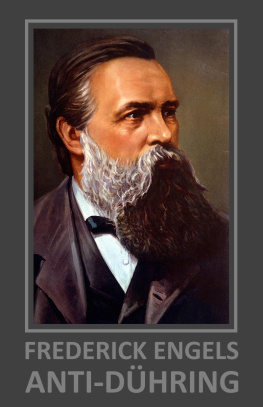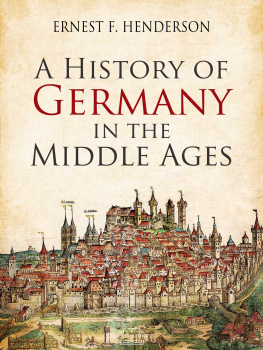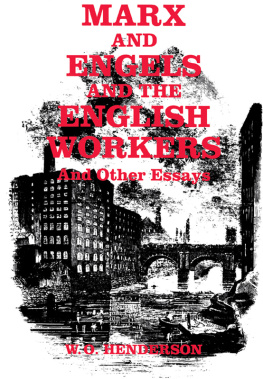Frederick Engels - The Peasant War in Germany
Here you can read online Frederick Engels - The Peasant War in Germany full text of the book (entire story) in english for free. Download pdf and epub, get meaning, cover and reviews about this ebook. year: 2016, publisher: Marxists Internet Archive, genre: Politics. Description of the work, (preface) as well as reviews are available. Best literature library LitArk.com created for fans of good reading and offers a wide selection of genres:
Romance novel
Science fiction
Adventure
Detective
Science
History
Home and family
Prose
Art
Politics
Computer
Non-fiction
Religion
Business
Children
Humor
Choose a favorite category and find really read worthwhile books. Enjoy immersion in the world of imagination, feel the emotions of the characters or learn something new for yourself, make an fascinating discovery.
- Book:The Peasant War in Germany
- Author:
- Publisher:Marxists Internet Archive
- Genre:
- Year:2016
- Rating:4 / 5
- Favourites:Add to favourites
- Your mark:
- 80
- 1
- 2
- 3
- 4
- 5
The Peasant War in Germany: summary, description and annotation
We offer to read an annotation, description, summary or preface (depends on what the author of the book "The Peasant War in Germany" wrote himself). If you haven't found the necessary information about the book — write in the comments, we will try to find it.
The Peasant War in Germany — read online for free the complete book (whole text) full work
Below is the text of the book, divided by pages. System saving the place of the last page read, allows you to conveniently read the book "The Peasant War in Germany" online for free, without having to search again every time where you left off. Put a bookmark, and you can go to the page where you finished reading at any time.
Font size:
Interval:
Bookmark:
Written: Summer 1850, London;
Published: Neue Rheinische Zeitung. Revue;
Translated: by Moissaye J. Olgin in 1926 for International Publishers;
Transcribed: by director@marx.org, July 1995, online Jan 4 1996;
Proofed and Corrected: Mark Harris (2010), Dave Allinson (2016).
Marxists Internet Archive
Available online at:
https://www.marxists.org/archive/marx/works/1850/peasant-war-germany/index.htm
The 1848 uprisings in Germany put Engels in mind of the last great peasant rebellions of the 1500s. As he would later write:
The parallel between the German Revolution of 1525 and that of 184849 was too obvious to be altogether ignored at that time.
Engels demonstrates the failure of both these revolutions was largely attributable to the bourgeois/burgerdom (and thus underscoring the modern need for an alliance between the working proletariat and the working peasantry).
The Peasant War in Germany was the first history book to assert that the real motivating force behind the Reformation and 16th-century peasant war was socio-economic (class conflict) rather than merely religious.
(1870)
(1874)
This work was written in London in the summer of 1850, under the vivid impression of the counter-revolution that had just been completed. It appeared in 1850 in the fifth and sixth issues of the Neue Rheinische Zeitung, a political economic review edited by Karl Marx in Hamburg. My political friends in Germany desire to see it in book form, and I hereby fulfil that desire, since, unfortunately, it still has the interest of timeliness.
The work does not pretend to present independently collected material. Quite the contrary, all the material relating to the peasant revolts and to Thomas Muenzer has been taken from Zimmermann whose book, although showing gaps here and there, is still the best presentation of the facts. Moreover, old Zimmermann enjoyed his subject. The same revolutionary instinct which makes him here the advocate of the oppressed classes, made him later one of the best in the extreme left wing of Frankfurt.
If, nevertheless, the Zimmermann representation lacks internal coherence; if it does not succeed in showing the religious and political controversies of that epoch as a reflection of the class struggles that were taking place simultaneously; if it sees in the class struggles only oppressors and oppressed, good and evil, and the final victory of evil; if its insight into social conditions which determined both the outbreak and the outcome of the struggle is extremely poor, it was the fault of the time in which that book came into existence. Nevertheless, for its time, and among the German idealistic works on history, it stands out as written in a very realistic vein.
This book, while giving the historic course of the struggle only in its outlines, undertakes to explain the origin of the peasant wars, the attitude of the various parties which appear in the war, the political and religious theories through which those parties strove to make clear to themselves their position; and finally, the result of the struggle as determined by the historical-social conditions of life, to show the political constitution of Germany of that time, the revolt against it; and to prove that the political and religious theories were not the causes, but the result of that stage in the development of agriculture, industry, land and waterways, commerce and finance, which then existed in Germany. This, the only materialistic conception of history, originates, not from myself but from Marx, and can be found in his works on the French Revolution of 18489, published in the same review, and in his Eighteenth Brumaire of Louis Bonaparte.
The parallel between the German Revolutions of 1525 and of 18489 was too obvious to be left entirely without attention. However, together with an identity of events in both cases, as for instance, the suppression of one local revolt after the other by the army of the princes, together with a sometimes comic similitude in the behaviour of the city middle-class, the difference is quite clear.
Who profited by the Revolution of 1525? The princes. Who profited by the Revolution of 1848? The big princes, Austria and Prussia. Behind the princes of 1525 there stood the lower middle-class of the cities, held chained by means of taxation. Behind the big princes of 1850, there stood the modern big bourgeoisie, quickly subjugating them by means of the State debt. Behind the big bourgeoisie stand the proletarians.
I am sorry to state that in this paragraph too much honour was given to the German bourgeoisie. True, it had the opportunity of quickly subjugating the monarchy by means of the State debt. Never did it avail itself of this opportunity.
Austria fell as a boon into the lap of the bourgeoisie after the war of 1866, but the bourgeoisie does not understand how to govern. It is powerless and inefficient in everything. Only one thing is it capable of doing: to storm against the workers as soon as they begin to stir. It remains at the helm only because the Hungarians need it.
And in Prussia? True, the State debt has increased by leaps and bounds. The deficit has become a permanent feature. The State expenditures keep growing, year in and year out. The bourgeoisie have a majority in the Chamber. No taxes can be increased and no debts incurred without their consent. But where is their power in the State? It was only a couple of months ago, when a deficit was looming, that again they found themselves in the most favourable position. They could have gained considerable concessions by persevering. What was their reaction? They considered it a sufficient concession when the Government allowed them to lay at its feet nine millions, not for one year alone, but to be collected indefinitely every year.
I do not want to blame the national liberals of the Chamber more than is their due. I know they have been forsaken by those who stand behind them, by the mass of the bourgeoisie. This mass does not wish to govern. 1848 is still in its bones.
Why the German bourgeoisie has developed this remarkable trait, will be discussed later.
In general, however, the above quotation has proved perfectly true. Beginning from 1850, the small States were in constant retreat, serving only as levers for Prussian and Austrian intrigues. Austria and Prussia were engaged in ever-stronger struggles for supremacy. Finally, the fearful clash of 1866 took place. Austria, retaining all its provinces, subjugated, directly and indirectly, the entire north of Prussia, while leaving the fate of the three southern States in the air.
In all these grand activities of the States, only the following are of particular importance for the German working class:
First, that universal suffrage has given the workers the power to be directly represented in the legislative assemblies.
Second, that Prussia has set a good example by swallowing three crowns by the grace of God. That after this operation her own crown is maintained by the grace of God as pure as she claims it to be, not even the national liberals believe any more.
Third, that there is only one serious enemy of the Revolution in Germany at the present time the Prussian government.
Fourth, that the Austro-Germans will now be compelled to ask themselves what they wish to be, Germans or Austrians; whom they wish to adhere to, to Germany or her extraordinary transleithanian appendages. It has been obvious for a long time that they will have to give up one or the other. Still, this has been continually glossed over by the petty-bourgeois democracy.
As to other important controversies concerning 1866 which were threshed out between the national-liberals and the peoples party
Font size:
Interval:
Bookmark:
Similar books «The Peasant War in Germany»
Look at similar books to The Peasant War in Germany. We have selected literature similar in name and meaning in the hope of providing readers with more options to find new, interesting, not yet read works.
Discussion, reviews of the book The Peasant War in Germany and just readers' own opinions. Leave your comments, write what you think about the work, its meaning or the main characters. Specify what exactly you liked and what you didn't like, and why you think so.










